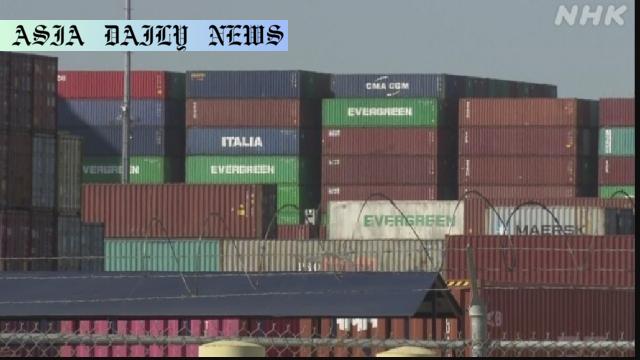Tariffs: US President Donald Trump is set to unveil a major announcement about reciprocal tariffs on Tuesday or Wednesday.
- US President Trump is preparing a major announcement concerning reciprocal tariffs.
- He claims the action aims to restore wealth and benefits to the United States.
- Specified countries may be exempt from these tariff policies.
- Responding to concerns, Trump remarked he is unconcerned about allies working with China.

Introduction: Trump’s Ambitious Tariff Announcement
On the heels of continuing discussion around global trade policies, President Donald Trump announced plans for a significant shift in the United States’ stance on tariffs. Scheduled for Tuesday night or Wednesday, this move signifies a broader push to address long-standing trade imbalances and positions the United States for a stronger economic footing. Trump emphasizes that the forthcoming announcement represents “the liberation of America” and aims to bring “tremendous wealth” back to the U.S.
The Core Idea: What Do Reciprocal Tariffs Mean?
The concept of reciprocal tariffs, as hinted at by the President, centers on ensuring trade practices are fair and mutual between countries. Trump has reiterated often that the United States has, for decades, faced economic exploitation by global trading partners. Paying higher import fees to foreign nations compared to the tariffs levied on American exports is a trend his administration is keen to reverse. By implementing reciprocal tariffs, Trump plans to level the playing field. While some nations might face tougher restrictions, exemptions may also be granted for strategic or allied partnerships.
Potential Impacts: Friends or Foes Aligning with China?
While the administration asserts these measures will strengthen American economic independence, concerns persist regarding how this decision might affect relationships with allied nations. A prominent question raised by the press suggested the possibility of close allies, such as Japan and South Korea, increasing their collaboration with China to counteract U.S. policies. Trump dismissed such apprehensions, confidently stating, “I’m not worried.” The President foresees a trend where countries dismantle their own tariff barriers under the influence of America’s bold position.
Global Reactions and Economic Implications
In response to whispers of harsher U.S. tariff policies, many countries have begun reassessing their economic strategies. China, Japan, and South Korea—leaders in global exports—are purportedly working together to address potential pitfalls of increased U.S. restrictions. This realignment, while concerning, underscores the seminal impact these new rules may have not just on American trade, but the global marketplace. Financial strategists anticipate that strengthened tariffs could lead to price hikes on imported goods within the United States, while encouraging domestic production across a range of industries.
A Pivotal Moment for America’s Trade Policies
As debates over global trade intensify, Trump’s announcement represents a historic moment for U.S. policy. Proponents argue that changes like these have been long overdue, especially with American industries struggling to compete against foreign players who benefit from reduced costs and higher market access. However, critics warn of retaliatory measures which could create friction with key allies and trading partners, further unsettling the already volatile global economy. Nevertheless, Trump’s consistent narrative assures citizens that putting America first won’t come without concrete economic advantages.
Conclusion: The Road Ahead
As Wednesday approaches, there’s no doubt that Trump’s announcement will reverberate across the business and political spheres. Whether this policy will usher in domestic prosperity or spark longer-term trade conflicts remains to be seen. However, this gamble reflects the administration’s commitment to reshaping America’s global role through a lens of economic empowerment. Regardless of the outcome, this move exemplifies Trump’s characteristic swing-for-the-fences approach to governance.



Commentary
Broad Implications for Domestic Economics
Trump’s planned tariff announcement signals a bold and transformative moment for the American economy. Whether or not one agrees with his policies, it is undeniable that the current administration has consistently sought to prioritize the nation’s economic interests. By holding foreign nations accountable for trade imbalances, the President is making a strong diplomatic and economic statement. If executed effectively, this move could spark a resurgence in domestic manufacturing sectors, an area long overshadowed by global competition.
The Risk of Alienating Allies
While the potential economic benefits for the U.S. are clear, the geopolitical repercussions of heightened tariffs cannot be ignored. Nations often resort to countermeasures in response to trade restrictions, and Trump’s policies might inadvertently strain relationships with allies. For example, close trading partners like Japan and South Korea are pivotal not just economically but also geopolitically. A shift in their alignment toward China could strategically isolate the U.S. at a time when global solidarity is increasingly vital.
Global Trade Outlook: A Balancing Act
The broader global trade landscape is unlikely to remain static in light of these anticipated developments. The alignment between China, Japan, and South Korea underscores a new type of collaboration that reflects global unease with unilateral economic policy. At its core, Trump’s tariffs seem to be an experiment in reshaping not just America’s trade landscape but also international trade norms. The long-term effects of such policies will undoubtedly hold valuable lessons for upcoming leaders in global diplomacy.